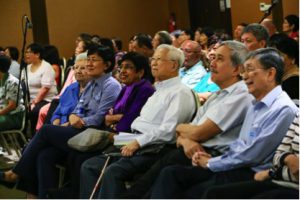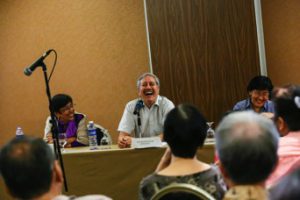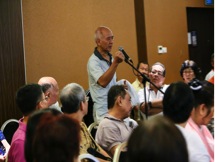Banish the word – “retired”
Seniors are encouraged to help change negative perceptions through active living, continuous learning and participation in the community.
BY: Mary Ng-Soon

Speakers at the forum, from left to right, Prof Paulin Straughan, Dr Kanwaljit Soin, Dr Philbert Chin and Dr Francis Pavri. Others seated with them include: social work trailblazer, Ann Wee and SACE's Goh Kim Seng.
The word “retired” became a “forbidden word” at the recent “Seniors Revalued” Forum held at the National University of Singapore Society (NUSS) in early December. Jointly organised by S-Connect and Sace/U3A, the 70-plus senior participants got to listen to three distinguished speakers and their perspectives on ageing.
First speaker, Dr Kanwaljit Soin, a consultant orthopaedic and hand surgeon at Mount Elizabeth Medical Centre, emphasised that the word “retired” should be “banished” from one’s vocabulary because many seniors, like her and others in the room, are still actively working, totally independent and contributing to the economy. She showed many slides with well-researched data to support her views.
In fact, she shared that the prevailing concept that seniors are dependent on younger working adults to support them should re-examined. To much laughter, Dr Soin mentioned that she knew of many mothers who had to lend money to their children to buy their cars or homes. She admitted that she herself is one of them.
“When we parents pass on, our homes, savings and claims from life insurance policies are passed to our children. The question then is who is supporting whom?” she asked.
To Dr Soin, “ageism”, a term coined by Dr Robert Butler (a world-renowned gerontologist and psychiatrist who founded the International Longevity Center in the US) in 1971, was and still is a kind of prejudice, a stereotyping faced by seniors. She shared that it is “a cultural bias in favour of youth” and it is keenly supported by the mass media.
Another speaker, Prof Paulin Straughan, a sociologist from the National University of Singapore (NUS) and vice-dean of the Faculty of Arts and Social Sciences, added that owing to the difficult years of Singapore’s early development, there “is a generation of frail seniors who have struggled hard, possessed little savings, and are dependent on their children. But this is no longer the norm and society has to overcome this perception”.
She reiterated that the seniors need to constantly help to change this perception through active living, continuous learning and participation in the community.
An active Rotarian in his 80s, Dr Philbert Chin, ex-president of RSVP, emphasised that many seniors are indeed actively volunteering in organisations such as RSVP of which he is also a founding member. Dr Chin believed that “the golden years of older persons could be rich and fulfilling, a time … for sharing their treasure trove of life experiences and skills”.
To continue his quote from the RSVP website, “I do not subscribe to the stereotype that ‘the elderly are needy and frail’ and that they are ‘the void deck people …’.
He added sadly that some RSVP members who are keen to learn some skills are sometimes hampered by learning organisations that don’t allow them to participate in their courses as they are “retired”.
So again, the word “retired” is being used to seniors’ disadvantage.
The forum ended with many questions asked by the vibrant participants. The chairperson of S-Connect, Dr Francis Pavri, reminded those asking questions not to describe themselves as “retired” but they had to state their age.
Mary Ng-Soon, 73, is an active member of NUSS S-Connect and SACE/U3A.



I beg to disagree. The word ” retired ” is neutral, as it has neither negative nor positive connotation, only in one’s mind. It simply describes the state of position in one’s life, like being employed or unemployed or being a student, employee or in business. In any case, one can retire at any age, when one no longer has to work for a living upon acquiring a pile of money to last more than one generation. Or one has earned enough & has lots of savings to retire from working for a living & to do something else at one’s leisure, pleasure or calling. This is a fact & a reality. Problem with void deck retired seniors is lack of sufficient proper formal education in looking far ahead of oneself in one’s senior years, so as to enjoy life in one’s senior years.